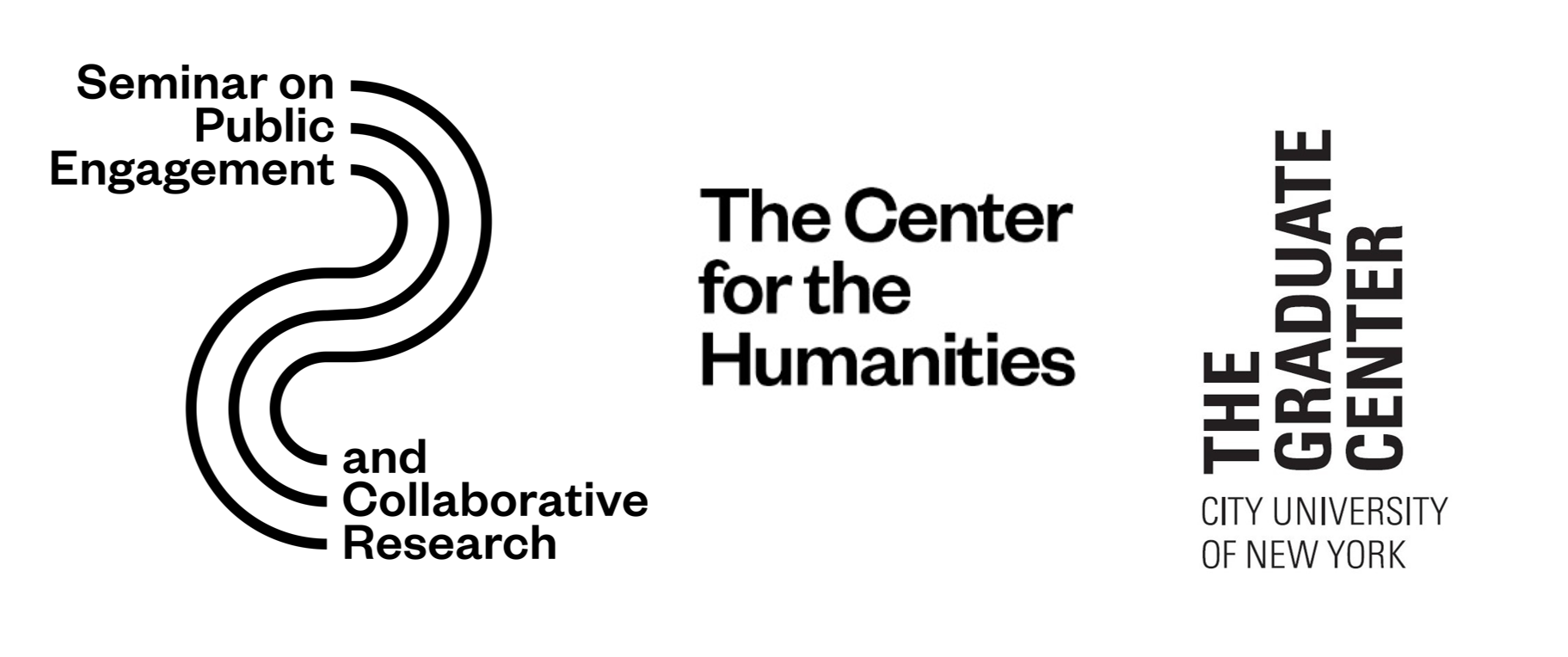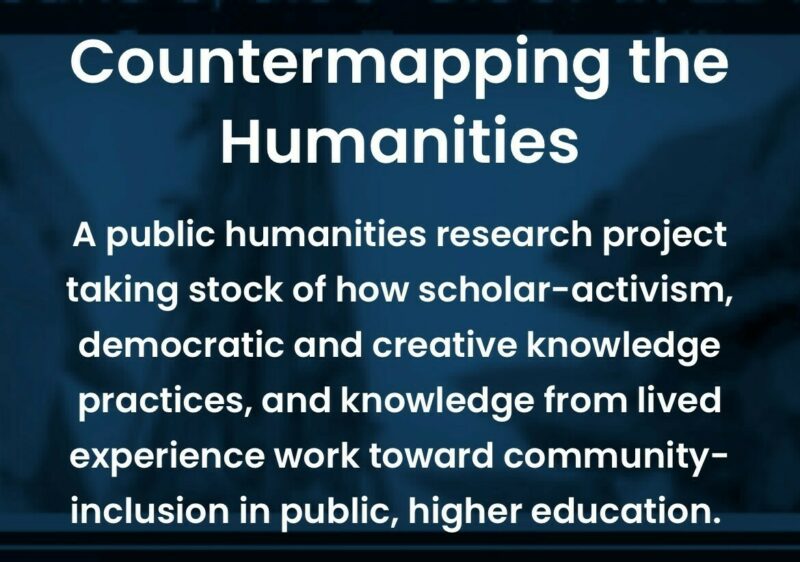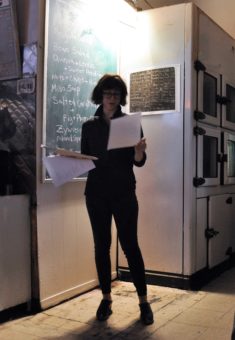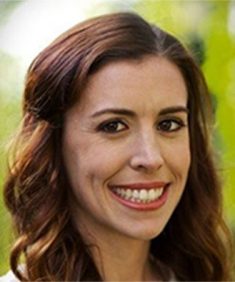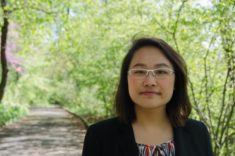About this public humanities project
Click here to download the Countermapping the Humanities Final Report.
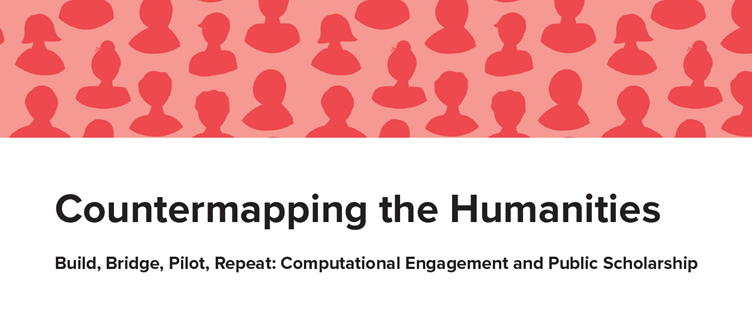
CUNY’s history, faculty, and student body are rich with humanities scholars who see their work as intimately tied to social justice and activism outside the university. This survey is an effort to learn from CUNY’s public humanities scholars, and their community partners, how scholar-activism, public higher education, and knowledge from lived experience can shape the future of public humanities.
If you are a student, faculty, or staff at CUNY working or taking classes in the humanities, we invite you to take the survey, and please share the website, resources, and survey with your communities, within and beyond the university.
To learn more about the project, browse our resources, or take the survey, visit our website: http://cmhpublics.com/.
If you have any follow up questions, please contact the project’s principal investigator, Kristine Riley: [email protected].
More about the project: the City University of New York (CUNY) has been an academic homebase to faculty and students for whom social justice is central to their research, teaching, learning, and service. As one of the nation’s largest and most racially, culturally, linguistically, and economically diverse universities, CUNY remains a catalyst for activist scholarship and social transformation. Since 2015, participants in the Andrew W. Mellon Seminar on Public Engagement and Collaborative Research from the Center for the Humanities at The Graduate Center, CUNY have ambitiously carried that tradition forward. Now in its third, successive grant cycle, the Seminar seeds dozens of creative, collaborative, and community-engaged projects that offer new ways of understanding and addressing pressing social issues.
Several Seminar projects have utilized Pol.is, a real-time system for gathering, analyzing and understanding what large groups of people think in their own words, enabled by advanced statistics and machine learning. Unlike multiple choice or even interview surveys, Pol.is allows for an interactive and conversational data collection process.
The capstone project of Pol.is’ collaboration with the Seminar is a survey on the stakes, aims and existing infrastructural support for public humanities at CUNY and focuses on three targeted areas: scholarship-activism, the purpose of public higher education, and knowledge that centers lived experience. Together, we hope to explore the uses of computational analysis in publicly-engaged humanistic discourse, scholarship, and activism. We also hope data will promote institutional recognition of activism as scholarship, building pathways for professional advancement for publicly-engaged scholars, and creating structures to support the knowledge practices of theorists situated outside of university settings.
Countermapping the Humanities
A public humanities research project taking stock of how scholar-activism, democratic and creative knowledge practices, and knowledge from lived experience work toward community-inclusion in public, higher education.
The CMH Survey is Closed!
But watch this video about the project to inspire your own digital outreach and recruitment
Foundational Concepts
Scholar-Activism
Challenges systems of oppression and connects one’s academic work to the pursuit of social welfare
Public Higher Education
Produces knowledges that serves the public and acts as a site of organizing for social movements
Lived Experience
Disrupts the academy’s traditions of neutrality and objectivity in knowledge-production to center diverse publics
Read more about how the project got started in this blogpost from Humanities for All

Part of the Seminar on Public Engagement & Collaborative Research
The Mellon Seminar on Public Engagement and Collaborative Research at the CUNY Graduate Center is an interdisciplinary platform for creative, activist, and scholarly research.
Checck Out Our Resources!
This project is committed to public scholarship and has a suite of resources to support CUNY’s public humanities communities.
About the Project
The humanities is a branch of knowledge that studies human beings–their values, capacities, environments, and cultures. Have you ever wondered how the humanities fit into your educational goals? Your professional or economic goals? How about the wellbeing of your family, community, neighborhood, city? Have you ever wondered about the role humanities might play in civic decision-making and more equitable futures? If so, you’re a public humanist! A public humanist is someone who coordinates opportunities for lots of people to come together to think, make, and create cultural activities that contribute to broader social justice and flourishing.
Project FAQs
What are the public humanities? The public humanities are a suite of democratic and creative knowledge practices that facilitate campus-community partnerships to help societies craft new ways of understanding and responding to the world(s) humans share and the challenges we face. According to Humanities for All, the overarching goals of the public humanities include:
- “Informing contemporary debates;
- Amplifying community voices and histories;
- Helping individuals and communities navigate difficult experiences;
- Expanding educational access; and
- Preserving culture in times of crisis and change.”
On the granular scale, the public humanities have the capacity to connect folks inside and outside the university toward common goals and creative projects through the joy of collaborative thinking and making. On the macroscopic scale, they have the power to shift the way universities function within larger publics to secure maximal civic engagement, social uplift, and flourishing.
Why CUNY? 79% of CUNY students attend NYC public schools and 80% of CUNY graduates remain in NYC. CUNY publics are NYC publics! CUNY is a powerful university to explore the potential of publicly-engaged work in the humanities toward transformative, activist ends.
Who should take the survey? Check here to see if you’re eligible. Please share widely with your eligible friends, colleagues, and publics!
Why the Center for the Humanities at the CUNY Graduate Center? The Center launched The Seminar on Public Engagement and Collaborative Research, the first public humanities platform of its kind at CUNY. Advancing transdisciplinary scholarship that engages the City University of New York’s myriad constituencies within and beyond the university toward transformative, activist ends, the Seminar is a structure for scholarly innovation grounded in collaborative, creative, and discursive public projects.
Why is this work important? Because it builds toward a more just, discursive, and creative society, wherein public well-being is measured in part by how many people are supported in their efforts to gain access to higher learning, produce and preserve culture, solve practical and intellectual problems, and facilitate social uplift on their own terms.
Can you help us expand public humanities work at CUNY by participating in this survey? The survey is built around agree/disagree statements. Click Agree if you agree with it and/or if it applies to you; click Disagree if not (or Pass/Unsure if appropriate). Each time you click, a new statement will appear in random order.
If your voice or perspective is missing from this survey, add your own agree/disagree statements in the box provided at the bottom of the survey interface. Your feedback may be integrated into the survey for future participants to weigh in on. You can add as many comments as you like.
Want to learn more about Pol.is? Read theses pieces about other Pol.is projects:
- “The simple but ingenious system Taiwan uses to crowdsource its laws”, MIT Technology Review
- “Building Consensus and Compromise on Uber in Taiwan”, Center for Public Impact
- “Taiwan is making democracy work again. It’s time we paid attention”, Wired
Want to know more about what makes a good Pol.is comment? Click here to learn more about how participant comments inform Pol.is conversations.
What’s next?
Our group values both the power of survey data, as well as believes in participatory and transdisciplinary research processes. We will conduct rigorous research, seek feedback on progress from engaged public humanities communities across CUNY, and make the resources and outcomes available to the publics.
The public-facing final report will be accessible via the Center for the Humanities’ website, published and distributed by Distributaries, the Seminar for Public Engagement and Collaborative Research’s publishing imprint showcasing new writing in the public humanities.
Access the full PDF Final Report here or at the bottom of this page.
Resources
Countermapping the Humanities Final Report

Click here to download the Countermapping the Humanities Final Report.
Project Zines
Resources developed by Kristi Riley
Public scholarship makes academic theory and research accessible to broader audiences in order to produce transformative change. These zines provide curated resources to help others start their own public humanities project:
- Interested in designing a similar project? Check out this Interdisciplinary Research Design Toolkit
- Curious how to build a website for your project? Browse the resources collected in Free Resources for Website Building & Design
- Want to learn more about the public humanities at CUNY? Here’s a collection of CUNY Humanities Department and Programs websites
NEW! The Countermapping the Humanities Lesson Plan
Resources developed by Kristi Riley
In an effort to support public humanities discourse and education, Countermapping the Humanities is releasing a suite of resources for instructors to customize and add to their syllabi for the Spring 2022 semester (and beyond!).



CMH-Lesson-Plan-Slides_FINAL-1Download

Countermapping CUNY

The Public Humanities Map
Click here or below to download and view the Public Humanities Map
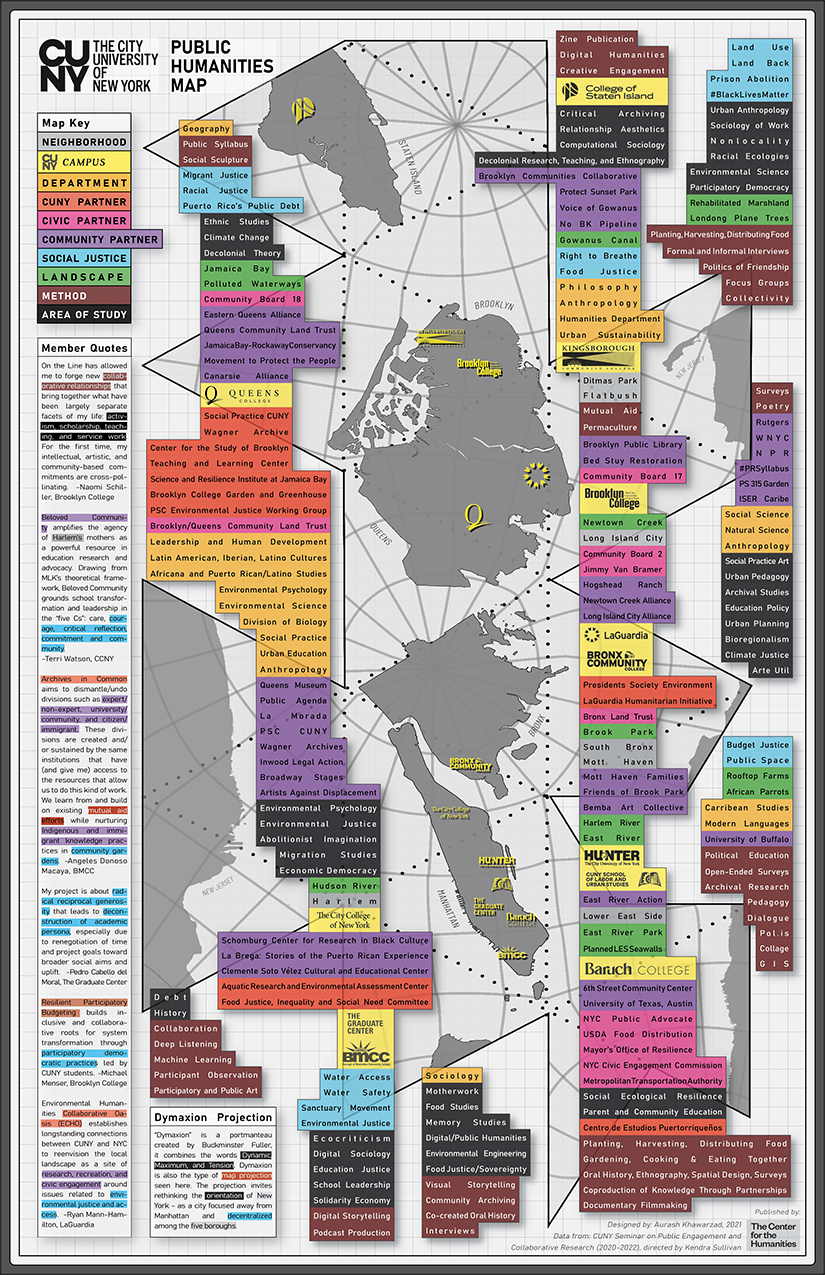
The Public Humanities Map, created for the Center for the Humanities by Aurash Khawarzad (Earth and Environmental Sciences, CUNY Graduate Center), is an attempt to frame the geographic scope and social connectivity of research projects being carried out by faculty in the Andrew W. Mellon Seminar on Public Engagement and Collaborative Research. Humanities programs at CUNY have been at the forefront of developing community-based participatory action research projects in the humanities that use creative practice, quantitative documentation, and everything in between – this map is an early attempt to document those various initiatives and facilitate analysis of how they relate to each other. As a whole, the map shows the wide range of people, neighborhoods, areas of research, and other factors that go into humanities studies. It reveals the centrality of doing “place-based” work, including building relationships with community members/organizations, in the process of better understanding complex political, environmental, economic, and related systems.
As its underlying map of New York City, the Public Humanities Map takes inspiration from the Dymaxion map projection, created by Buckminster Fuller and Shoji Sadao in 1954. The map projection shows the surface of the Earth as a connected series of land masses within one ocean. It is recognized for having little distortion of continents, unlike the often used Mercator projection. As a map of New York the dymaxion projection represents the City as its own world, with connected boroughs but without one center. Decentralizing New York, as opposed to a Manhattancentric map, the dymaxion projection is an appropriate canvas for a city where communities on the fringes have disproportionate power in society but play a very important role in its culture, economy, and much much more.
For more information on Aurash’s work, visit www.aurashkhawarzad.com.
The CUNY Basemap
Maps inspire new ways of knowing “place,” and spark novel approaches to scholarly inquiry, practice, and relationship-building. Aurash has designed a base map for public humanities scholars who wish to use cartography as a means to better understand the myriad impacts of engaged practice in public space.
The CUNY Basemap is an attempt at creating a tool for researching the humanities and/or sciences issues related to the university and its environs. The map highlights basic fundamental features of the five boroughs, including the location of each of the 25 CUNY campuses, but mainly provides room for original research conducted by CUNY faculty and students. For researchers the blank map can be used as a repository for robust datasets, or it can be a survey tool conducted by an individual “on-site”. As the map is used by various researchers at the university, it forms a compendium of spatial and social knowledge about CUNY and broader New York City.
For more information on Aurash’s work, visit www.aakpress.com.
2020-2022 Project Team
Kristi Riley is a PhD candidate in the sociology program at the CUNY Graduate Center. Her studies focus on critical criminology, feminist theory, and popular culture. Her dissertation examines how liberal feminist narratives about women working in the criminal legal system mask the evolution and expansion of carceral control. She holds B.A.s in psychology and community studies from the University of California, Santa Cruz, a Master’s of Science in conflict resolution from the University of Oregon Law School, and a Master’s of Philosophy in sociology from the CUNY Grad Center. Prior to becoming a Fellow, Kristi spent the past decade working to reform the criminal legal system, most recently on issues related to reducing the use of jail incarceration at the local level. She’s taught sociology and criminal justice courses at CUNY’s Borough of Manhattan Community College, Baruch College, and Hunter College.


Kendra Sullivan is the director of the Seminar on Public Engagement and Collaborative Research at the Center for the Humanities at the CUNY Graduate Center, where she also acts as publisher of Lost & Found: The CUNY Poetics Archive Initiative and general program director. She has a master’s in Sustainability and Environmental Education from the CUNY Graduate Center, where she is currently pursuing her PhD in English, with a focus on the environmental humanities. Her writing has appeared and is forthcoming in BOMB, F.R. DAVID, and C magazine. Her artwork has been exhibited at the Parrish Art Museum in Water Mill, NY; The Bureau for Open Culture at MASS MoCA; and The Carpenter Center for Visual Arts at Harvard University. Her curatorial projects include: Sea Worthy (2011), Ed Sanders: Seeking the Glyph (2015), Accompaniment (2015), and Resistance After Nature (2017). She has performed her own works at the Banff Centre, Alberta; Dexter Sinister, NY; and tenletters, Glasgow; and as part of Robert Ashley’s The Trail of Anne Opie Wehrer at the Whitney Biennial in 2014 and at 356 Mission in 2016. She is the grateful recipient of grants and residencies from the Graham Foundation for Advanced Studies in Fine Arts, the Banff Centre, and the Montello Foundation, among others. She is a member of the eco-art collective Mare Liberum and co-founder of the Sunview Luncheonette, a community space for art and politics run out of a stopped-in-time diner in Greenpoint, Brooklyn.
Nga Than is a PhD student in sociology at City University of New York – The Graduate Center. Her research interests are in social media, computational social science, international migration, and sociology. As a mixed-methods scholar, she has conducted qualitative research using interviewing, as well as employing machine learning to analyze text data, and administrative data. Her research has received support from the German Academic Exchange Service (DAAD), Taiwan’s Huayu Enrichment Scholarship, CUNY – Pre-dissertation Fellowship, and CUNY – Provost’s Digital Innovation Grant.

Special Contributors
Thank you to Ahmed Soliman for the instructional video and Aurash Khawarzad for allowing us to host the Public Humanities Map and CUNY Base Map.
Special Thank You’s
This project wouldn’t be possible without the support and community provided by The Center for the Humanities Staff and fellows from The Seminar on Public Engagement and Collaborative Research.
We want to extend a special thank you to the entire team at The Computational Democracy Project for working with Seminar fellows on ways to use Pol.is in collaborative, transformative, and interdisciplinary research.
This project also benefited from the learning community created in the Graduate Center’s Introduction to Digital Humanities. Visit the official page for the Graduate Center’s Digital Humanities program.
